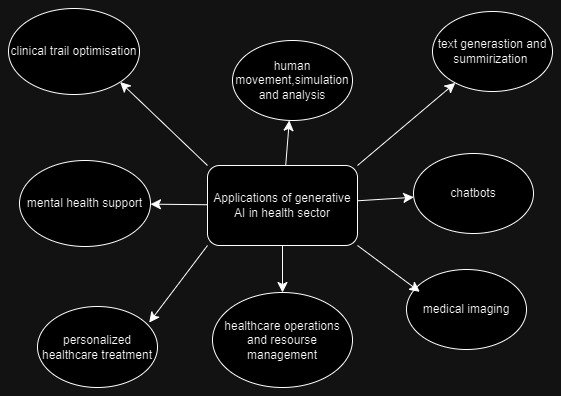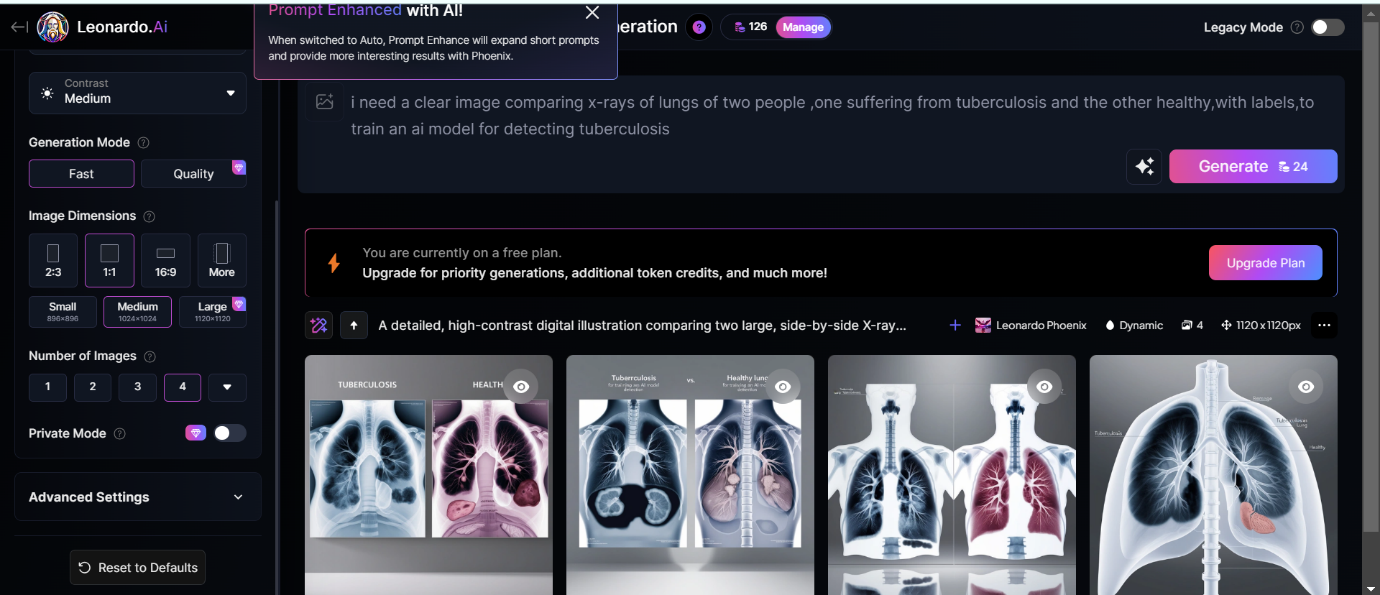By: K. Sai Spoorthi, Department of computer science and engineering, Student of computer science and engineering, Madanapalle Institute Of Technology and Science, 517325, Angallu, Andhra Pradesh.
Abstract
A technology becomes more useful and identified only when it is integrated with any field and useful to mankind. Generative AI being the most discussed topic these days is grabbing everyone’s attention since it creates new content resembling human creativity. Using Gen AI in health has been identified productive since it saves time and many new ideas on research can be developed. In the field of health, research and updating are as important as the treatment and patients care. So, integrating research and prediction of medicines using generative AI stands as a revolution. There are many contexts in which it GenAI can be integrated, out of which a few can be explored through this article.
Key words: Generative AI, Healthcare Industry, Research, Deep learning, large language processing models, Medical chatbots.
Introduction
Artificial Intelligence being the revolution in the upcoming world, has its wings spread in every sector irrespective of the role either directly or indirectly. Basically, ai and gen ai are contributing for them to become advanced. Likewise, healthcare is one of the most vital industries. Health care does not only consist of hospitals but has a very vast scope to get integrated with the ai technology. More than a direct cure for disease it helps in aspects like personalized treatment for patients, building chatbots for treatment advice, mental health support, medical image examining etc…. Being a system, AI cannot directly put its efforts in caring for the patient and match the tasks of a doctor since it can be risky and would not be trustable but does other things like maintaining the records, scheduling the workday, predicting the outcomes of a medicine in research field. A traditional ai system should be trained and given a labelled dataset as input to predict outputs whereas GenAI will be used in creating new things. So, with the help of GenAI we can generate medical images and train the AI model with huge data. It can also be used know what the outcome would turn out to be in case of any new medicine or invention.
What is GenAI
Gen AI unlike traditional ai understand patterns and process large amounts of data to accomplish tasks which must be realistic and match human capability. Generative ai consists of an integration of machine learning techniques, deep neural networks, and natural language processing (NLP) algorithms to analyse huge datasets and produce outputs that seem like the human generated ones. Until now we have a few generative ai models which give outputs in the form of images, voices, text and videos. Though gen ai can’t directly do the job of a medical expert it can help make the work easier with the help of some models like ChatGPT and DALL-E which acts as aids in the applications of medical imaging, drug discovery, personalized patient treatment, medical simulation and training, clinical trial optimization, mental health support, healthcare operations and research, medical chatbots, human movement simulation, and a few more.[1] Anyways ,there are a few that are to be discussed and took care of such as interpretability, data availability, transparency, and ethical considerations. In spite of all these challenges, Gen AI has a scope to revolutionize the health care sector.
Applications of Gen AI in health industry
Generative ai has got its prominent place in health industry too. Though it does directly affect the patient care its has its impact on large scale .Traditional ai has its applications like disease prediction by analysing the symptoms of it, it needs a huge data to train the ai model which might not be easy in case of diseases that are arousing recently making the process difficult.in addition to this health industry needs the most research to overcome and prevent existing and new diseases. [2]GenAI plays a prominent role in this research and administration too. Despite human ability, we find machine’s capabilities are remarkable. Even in the administration GenAI started making things simpler and convenient by doing tasks like extracting relevant information from various sources. It does minimize the manual input dataset and maximises the correctness of medical records. some of the major applications that are gaining importance are AI-powered chat bots which can clarify medical queries, appointment alerts and schedules, and follow-ups. By making the above tasks as shown in fig1, easier the medical staff can actually focus on serving the patients [3]. To explore the applications in detail, a brief case study on two of the applications, medical imaging, predictive analysis, medical advisory chatbots are prospected

Case study of two Applications
Out of the numerous applications of Gen AI in the field of health, including medical imaging encompassing image reconstruction, image-to-image translation, image generation, and image classification, protein structure prediction, clinical documentation, diagnostic assistance, radiology interpretation, clinical decision support, medical coding, and billing, as well as drug design and molecular representation, medical imaging and medical advisory chatbots are studied. [4]
Medical Imaging
In medical image generation, generative models have revolutionized image enhancement, restoration, and creation. To train any traditional model we need huge dataset which might not be available in case of new discovery invention or predicting a new disease. To solve that problem, we can use Gen AI to achieve huge datasets and train the models in order to get accurate outputs.[5]

Medical advisory chatbots
The chatbots have become multidisciplinary there is no one place where AI chatbots are not included. It is important to educate patients with the necessary knowledge before treating them. By the implementation of medical chatbots there is a very transparent and miss conception free communication. The implementation has also started in a wide scale. A University named Kansas Health System has planned to deploy Gen AI application across over 140 of their locations to ensure doctor-patient interactions as well as to make clinical documentation as real-time application, especially to minimize administrative burnout. [6]
Systems used
There are various Generative ai model that are similar to ChatGPT but are specialized in the field of medicine helping the medical field get better and research sophisticated. These models take the inputs in the form of text and images, after which process those inputs by analysing them thoroughly giving required outputs essentially in form of images and contexts. These will be achieved by using deep learning techniques and large language models, large language models usually provide the potential ability to make human-computer interactions better and instead of manual jobs, automate them in as many sectors as possible where language understanding are essential[1][6,7].
Conclusion
According to the explored divisions, Gen AI is as important as the traditional AI especially in healthcare. Ai has been the most discussed topic out of which Gen AI is proving its potential by contributing to sophisticating lives of people in all sectors. Though Gen AI cant directly cant serve in caring for the patients it does many functions by monitoring, administering, research, disease predicting and more. This is achieved by large language processing models, Neural networks and deep learning methods. There is a huge scope for Gen AI to make health sector better and advanced by integrating them.
References:
- S. Sai, A. Gaur, R. Sai, V. Chamola, M. Guizani, and J. J. P. C. Rodrigues, “Generative AI for Transformative Healthcare: A Comprehensive Study of Emerging Models, Applications, Case Studies, and Limitations,” IEEE Access, vol. 12, pp. 31078–31106, 2024, doi: 10.1109/ACCESS.2024.3367715.
- M. Rahaman et al., “Utilizing Random Forest Algorithm for Sentiment Prediction Based on Twitter Data,” 2022, pp. 446–456. doi: 10.2991/978-94-6463-084-8_37.
- B. Johnson, “Revolutionizing Healthcare with Generative AI,” BMH Med. J. – ISSN 2348–392X, vol. 11, no. 2, Art. no. 2, Mar. 2024.
- Y. Shokrollahi, S. Yarmohammadtoosky, M. M. Nikahd, P. Dong, X. Li, and L. Gu, “A Comprehensive Review of Generative AI in Healthcare,” Oct. 01, 2023, arXiv: arXiv:2310.00795. doi: 10.48550/arXiv.2310.00795.
- C.-Y. Lin, M. Rahaman, M. Moslehpour, S. Chattopadhyay, and V. Arya, “Web Semantic-Based MOOP Algorithm for Facilitating Allocation Problems in the Supply Chain Domain,” Int J Semant Web Inf Syst, vol. 19, no. 1, pp. 1–23, Sep. 2023, doi: 10.4018/IJSWIS.330250.
- E. Loh, “ChatGPT and generative AI chatbots: challenges and opportunities for science, medicine and medical leaders,” BMJ Lead., vol. 8, no. 1, Mar. 2024, doi: 10.1136/leader-2023-000797.
- Mamta, & Gupta, B. (2021). An attribute-based keyword search for m-health networks. Journal of Computer Virology and Hacking Techniques, 17(1), 21-36.
- Khan, A., & Gupta, B. B. (2022). WSNs and IoTs for the Identification of COVID-19 Related Healthcare Issues: A Survey on Contributions, Challenges and Evolution. Security and Privacy Preserving for IoT and 5G Networks: Techniques, Challenges, and New Directions, 225-262.
Cite As
Spoorthi K.S. (2024) Revolutionizing Healthcare: Generative AI Applications, Insights2Techinfo, pp.1